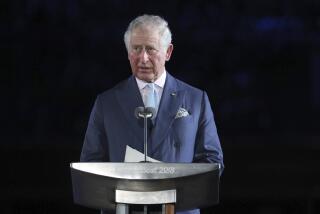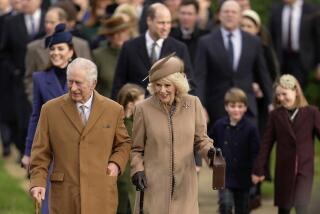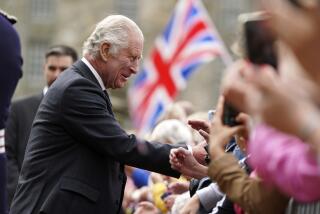Prince Charles Tilts Against an English Windmill
- Share via
Last summer, according to the London Times, the Prince of Wales complained publicly that English was being taught “bloody badly” in English schools, revealing that his own staff couldn’t speak or write correctly. (He has to correct his own letters.)
Recently, according to the Manchester Guardian Weekly, Prince Charles renewed his campaign to inspire respect “for what may loosely be referred to as our heritage,” reading in public a rendition of Shakespeare’s famous “To be or not to be” soliloquy the way a modern English student might write it.
Like his great-great-grandfather, Edward VII, Prince Charles has been denied the throne by the health and tenacity of his mother. Poor jolly Edward was almost 60 years old, and rather weakened by debauchery, when Victoria, at the age of 81, finally surrendered the British Empire (and India) to him on Jan. 22, 1901, having stubbornly lived 22 days into the 20th Century.
Charles is proving that he cares about more than hunting and ceremonials by urging his country’s educational establishment to return to reading, writing and drilling in grammar, spelling and punctuation.
Speaking as a patron of the Thomas Cranmer Schools Prize, Charles acknowledged that some may think his concern exaggerated. “Indeed, as I have discovered only too plainly, if you actually stand up and talk about the importance of our heritage and the lessons to be learnt from our forebears, you are at once accused of having a quaint nostalgia for a picturesque, irrelevant past. It has forced me to reflect on why there is such a fierce obsession about being ‘modern.’ ”
To illustrate his point, Charles read a parody of Hamlet’s soliloquy in modern jargon:
Well, frankly, the problem as I see it
At this moment in time is whether
I should just lie down under
All this hassle
And let them walk all over me,
Or, whether I should just say: ‘OK,’
I get the message,’ and do myself in.
I mean, let’s face it, I’m in a no-win
Situation, and quite honestly,
I’m so stuffed up to here
With the whole stupid mess
That, I can tell you, I’ve just got
A good mind to take the quick way out.
That’s the bottom line....
When I read that I was reminded of a piece I had read in the paper a day or two earlier. It was an interview by Thomas Bonk, our tennis writer, with Angelica Gavaldon of Coronado, a 16-year-old who appears headed for the top rank of women’s tennis. Gavaldon had just made it to the quarterfinals of the Australian Open, but being still an amateur, had lost $24,000 in prize money. Bonk quoted her as follows:
“I think I want to turn pro, you know, because it’s like I lost around $24,000, you know. It’s like I’m there, you know, and sweating and everything, and I’m not keeping my money, you know. . . .”
Of course Angelica is only a teen-ager; she had just upset two of the top players in women’s tennis; perhaps it was her first important interview. We don’t expect her to talk like Lady Macbeth. Nevertheless, her language sounds a lot like the prince’s debased Hamlet. One hopes that, as she matures, she may employ it with more grace.
“It is a remarkable fact,” Charles said, “that in these islands we have produced the world’s most successful language. . . . Yet a great many people today look in dismay at what is happening to that language in the very place where it evolved. Looking at the way English is used in our popular newspapers, our radio and television programs, even in our schools and our theatres, they wonder what it is about our country and our society that our language has become so impoverished, so sloppy and so limited--that we have arrived at such a dismal wasteland of banality, cliche and casual obscenity. . . .”
At a time when bilingual education is controversial, it may seem that I am advocating English-only. I am not against a bilingual approach, but at a time when English is no longer the first language of many of our children and our older citizens, it seems to me all the more important to keep it vigorous, eloquent and clear.
As Prince Charles says, it’s the world’s most successful language.
Way to go, Charles.
More to Read
Sign up for Essential California
The most important California stories and recommendations in your inbox every morning.
You may occasionally receive promotional content from the Los Angeles Times.












